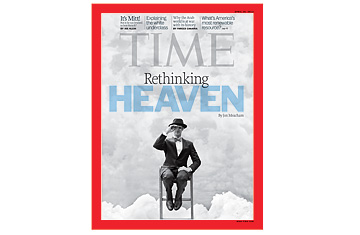
(4 of 6)
Different understandings of heaven in American history tell us something about the values of given eras. In excellent books in recent years, Gary Scott Smith (Heaven in the American Imagination) and Lisa Miller (Heaven: Our Enduring Fascination with the Afterlife) have explored these ever mutating visions of the afterlife. For the Puritans, heaven was centered on the praise and constant worship of God himself: the Lord was the center of attention. In the Victorian era, the imagery of family became more intimately associated with views of heavenly life; the Mormon proposition that families were bonded one to another for all eternity was the fullest manifestation of this domestication of the afterlife. For African Americans during the battle over abolition and the Civil War, heaven was seen as a glorious afterlife, a release from their earthly chains. It is no wonder that slaves would sing for a sweet chariot to swing low and carry them home, since their temporal home was so miserable.
In the more prosperous 20th century, heaven became a kind of glorious Disney World--or, depending on your taste, a transfigured Tiffany's, a celestial Cartier--a place where the redeemed were rewarded with the type of riches they had sought in life. This is the view that is so familiar: in the words of Billy Graham, heaven "is far more glorious than anything we can imagine. Heaven is like the most perfect and beautiful place we can conceive--only more so."
And so from the young (4-year-old Colton Burpo) and the old (93-year-old Graham) we are to see heaven as a place apart from the world where we find peace and light and love.
Rethinking Heaven
A seemingly unlikely leader of the charge against the Burpo-Graham view is Wright, the former bishop, an intriguing figure in contemporary Christianity. Born in 1948, he is a thoroughgoing Englishman--donnish in his scholarship and vivid in his writing. Wright is impossible to consign to any single theological or ideological category. He weighs scholarly and historical evidence with a fair mind, often coming to orthodox conclusions. A deeply conservative Roman Catholic friend of mine described reading Wright's 2003 book The Resurrection of the Son of God, which argues that Jesus did indeed physically rise from the dead, as the "most bracing intellectual experience" he'd had in a decade. On questions of homosexuality--a familiar source of controversy in the Anglican Communion--Wright is also more conservative.
Yet in several books, including Surprised by Hope: Rethinking Heaven, the Resurrection, and the Mission of the Church (2008) and After You Believe: Why Christian Character Matters (2010), Wright has articulated a radically different view of heaven than the one American Christians tend to carry in their heads. "Heaven, in the Bible, is not a future destiny but the other, hidden dimension of our ordinary life--God's dimension, if you like," explains Wright. "God made heaven and earth; at the last he will remake both and join them together forever." Even in the climactic images of the 21st and 22nd chapters of the Book of Revelation, Wright points out, "we find not ransomed souls making their way to a disembodied heaven but rather the new Jerusalem coming down from heaven to earth, uniting the two in a lasting embrace."
